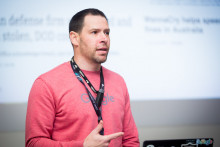Stone’s ‘myth busting’ talk is one out of 70 given at the festival. This is the first edition, organised by the UT and het Genootschap voor Risicomanagement, of what should become an annual event, as per the organizers. The festival is mostly aimed at companies although there are also students among the 300+ visitors. The schedule is packed and the several large posters with directions and timetables are no frivolous luxury.
Making risk less cloudy
Stone, who recently arrived form the United States, not only talks about dragons but also about sharks. In fact, the whole talk is a surprising combination of technological jargon as well as light-hearted jokes and a few surprises. The shark is a good example of the latter. Stone: ‘Did you know that Google faces shark attacks on its transatlantic cables? Even those cables need to be made resilient to withstand such a risk.’
Sharks are exemplary of not just the depth but also the scale that Google needs to operate on to protect its services. This goes beyond security measures and even enters the political stage, Stone explains. When asked about the recent controversy in the Netherlands surrounding the ‘sleepwet’, Stone said: ‘Google actively tries to reject requests from governments to access their (search) data, unless they are required to do so by law.’
‘These government requests are all listed by Google on their website’, he continues. ‘It is this transparency that is the key to obtaining people’s trust and ultimately debunking the myth.’ Another way to do this, is by actively helping people who are under attack from hacker groups. Stone said that Google recently helped someone who faced a 350 gigabit-per-second DDoS-attack by letting the Google servers sustain the brunt of it. This also helps in making their own system more resilient.
The road to resilience
Sharks and facing hacking attacks as a form of charity, it’s perhaps not what first comes to mind when you think of ‘risk’ and ‘Google’. This unpredictable nature of risk can be seen as one of the underlying themes of the festival. After all, the definition of resilience is that you can recover from any risks or difficulties. Herein lies the challenge: how do we build up the capacity to be resilient against the unknown?







